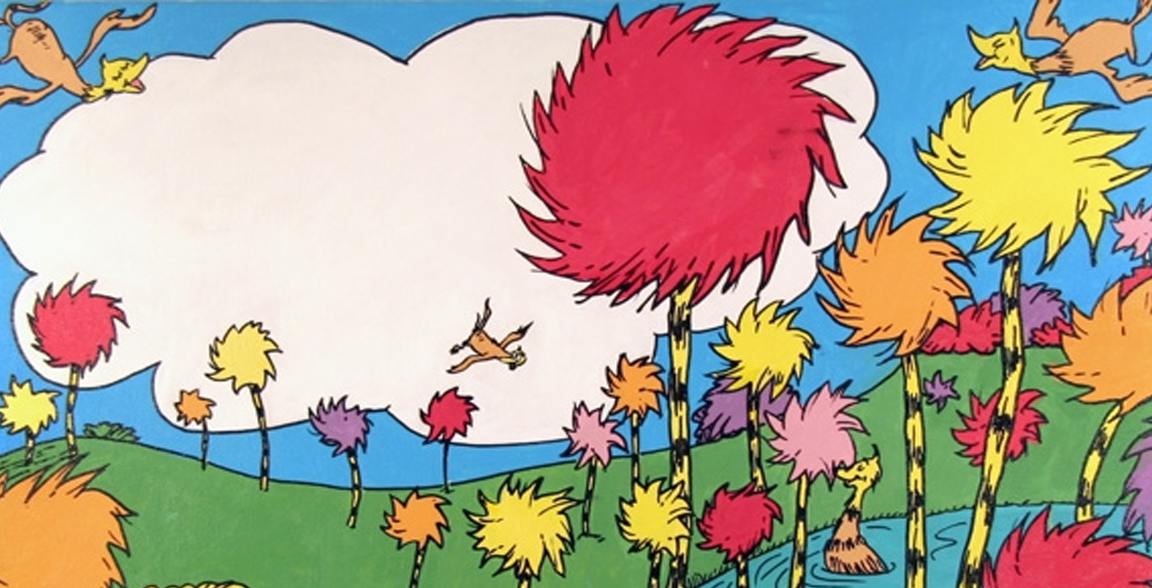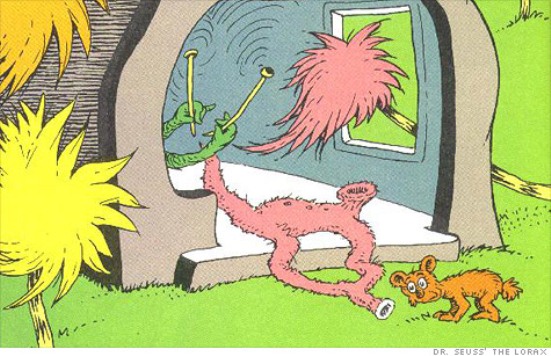At the far end of town where the Grickle-grass grows and the wind smells slow-and-sour when it blows and no birds ever sing excepting old crows…is the Street of the Lifted Lorax. And deep in the Grickle-grass, some people say, if you look deep enough you can still see, today, where the Lorax once stood just as long as it could before somebody lifted the Lorax away.
For several years I have wondered what the future holds for the Church. Before then, I’d always envisioned the stone carved out of the mountain without hands, rolling forth to fill the earth. That is what I observed on my mission in Brazil nearly 25 years ago, where once we caught two buses and trekked up a big hill for 20 minutes to reach the chapel for the baptism of my friend Antonio; now, due to the growth of the Church, Antonio lives a five-minute walk to the chapel and a ten-minute drive to the temple.
What was the Lorax? Any why was it there? And why was it lifted and taken somewhere from the far end of town where the Grickle-grass grows?

But since then, I have seen my sister and my daughter and one of my favorite former missionary companions leave the Church—not because of laziness or sin, but because church policies and practices made their lives less healthy, less whole. I have seen the youth in our ward—wonderful kids—mostly grow up and leave, though some stay. I have seen Bloggernacle friends, full of zest for the gospel, sincere in their desire to help create a better church and Zion community, alienated by the Public Affairs response to Ordain Women and the disciplinary actions against Kate Kelly and John Dehlin. I have read accounts of former General Authority Marlin Jensen admitting that the Church has not seen such a falling away since the days of Kirtland.
I don’t know whether these anecdotes represent genuine trends; only the Church knows that. But the slow-motion exodus feels real to me. Our world has changed, Google and Facebook have happened, and perhaps we are slow to adapt. What is happening to this church I love?
It all started way back…such a long, long time back…Way back in the days when the grass was still green and the pond was still wet and the clouds were still clean, and the song of the Swomee-Swans rang out in space…one morning, I came to this glorious place. And I first saw the trees! The Truffula Trees!

President Hinckley once declared that, “The strength of the Church is not in its thousands of houses of worship across the world nor in its universities or seminaries and institutes…The strength of this Church lies in the hearts of its people, in the individual testimony and conviction of the truth of this work.”
We are the Church, and within our hearts lies its strength. And yet many of those hearts are hurting.
Then I chopped down a Truffula Tree with one chop. And with great skillful skill and with great speedy speed, I took the soft tuft. And I knitted a Thneed!
We began with the Correlation Thneed, that met many important needs. Since then we’ve been knitting the rigid-gender-role Thneed, the nuclear-family Thneed, and the literal-interpretation-of-the-scriptures Thneed. Stitch by stitch we’ve woven the conservative-American-politics Thneed, the living-the-temple-recommend-checklist Thneed, and the For-the-Strength-of-Youth Thneed, along with its accompanying no-tattoo-or-double-piercing knit cap.

I fear that these and other Thneeds threaten to create a hollowed out religion that is heavy on rules and obedience and checklists and light on grace and soul-transformation and atonement. And those who do not fit into the Thneeds—the working mom, the gay dad, the single sister, the spiritual seeker, the teenaged feminist? Well, their voices are often lost.
I am the Lorax. I speak for the trees. I speak for the trees, for the trees have no tongues. And I’m asking you, sir, at the top of my lungs…What’s that THING you’ve made out of my Truffula tuft?
I sometimes wonder who speaks for these members.
We hear that the women do not want the Priesthood, that the Church treats them equally. But have we asked the women who’ve left the Church?
We are told that the temple is the pinnacle of our worship, a place of sublime peace and divine connection. But do we tolerate the tales of the women who find the temple ceremony distressing?
Look, Lorax, I said. There’s no cause for alarm. I chopped just one tree. I am doing no harm. I’m being quite useful. This thing is a Thneed. A Thneed’s a Fine-Something-That-All-People-Need!

I repeat, cried the Lorax, I speak for the trees! I’m busy, I told him. Shut up, if you please.
Unfortunately, we have learned by sad experience that expressing dissent is not safe. We have not yet created a safe space for doubters or a sheltered haven for those hurt by church policies and practices. And we have clogged the arteries that carry feedback to the organizational heart of the Church, the one that sets policies in Salt Lake City.
The trees are disappearing. Who speaks for the trees?
We were all knitting Thneeds just as busy as bees, to the sound of the chopping of Truffula Trees. Then…Oh! Baby! Oh! How my business did grow!
We proclaim our numbers in General Conference and in City Creek and luxury condominiums in Philadelphia. Business is growing—our tithes are proof—but what of the strength of the Church? Do we hear the words from the hearts that are hurting?
I’m the Lorax who speaks for the trees which you seem to be chopping as fast as you please. But I’m also in charge of the Brown Bar-ba-loots who played in the shade in their Bar-ba-loot suits and happily lived, eating Truffula Fruits. NOW…thanks to your hacking my trees to the ground, there’s not enough Truffula Fruit to go ’round…They loved living here. But I can’t let them stay. They’ll have to find food. And I hope that they may.

They loved living here—many of my feminist friends. But their souls are famished by our preference for patriarchy which takes precedence over seeing and meeting their individual spiritual needs.
As my co-blogger Melyngoch wrote of her drift into less-activity:
…while I am still a believing member, it’s hard, now, to feel that it matters whether I go to church or not. I encounter a few friends there, but I find more suspicion and pity, and structurally, I am asked and allowed to contribute nothing. It feels nothing but empty, trying to find God in a place where I can barely recognize myself as a person.
Then again he came back!…I am the Lorax, he coughed and he whiffed…My poor Swomee-Swans…why, they can’t sing a note! No one can sing who has smog in his throat. And so, said the Lorax,–please pardon my cough–they cannot live here. So I’m sending them off.

And what of the LGBT members? In my ward and many others they are completely invisible—either carefully in the closet or else long gone. At church, rare is the leader or teacher or even regular old member who acknowledges their existence and the value of their lives—speaking of them as beloved individuals rather than as an abstract “other”.
If my son came to me and said, “Dad, I think I’m gay,” I would suggest to him that we go find him a faith community where his sexual identity would not be maligned as deviant, where he would be affirmed as a cherished child of God rather than slowly compelled into a belief that God deems him fundamentally flawed.
It is profoundly sad to me that I do not believe that my religion would be safe for such a child.
And then I got mad. I got terribly mad. I yelled at the Lorax, Now listen here, Dad! All you do is yap-yap and say, Bad! Bad! Bad! Bad! Well, I have my rights, sir, and I’m telling you I intend to go on doing just what I do!
In response to the voices of members who are hurting, I wonder if we’ve internalized the lesson that Harold B. Lee taught an impressionable young Boyd K. Packer: “You must decide which way you face. Either you represent the teachers and students…or you represent the Brethren…Some of your predecessors faced the wrong way.”
As we face the Brethren we think that all is well in Zion because the voices that might warn us otherwise have left or have self-censored as an act of self-preservation.
And at that very moment, we heard a loud whack! From outside in the fields came a sickening smack of an axe on a tree. Then we heard the tree fall. The very last Truffula Tree of them all!

The Lorax said nothing. Just gave me a glance…just gave me a very sad, sad backward glance…as he lifted himself by the seat of his pants. And all that the Lorax left here in this mess was a small pile of rocks, with one word…UNLESS.
Unless. Unless we can recognize each member as a valued part of the whole with something to teach us about how to be a healthy institution for all. Unless we can make Elder Uchtdorf’s mantra, “There is room for you here,” into a reality for those within our sphere of influence.
Through the years, while my buildings have fallen apart, I’ve worried about it with all of my heart. But now…the word of the Lorax seems perfectly clear. UNLESS someone like you cares a whole awful lot, nothing is going to get better. It’s not.
I hope, and sometimes even believe, that it is not too late. But if we care a whole awful lot, we must learn to listen and act before the Bar-ba-loots and Swomee-Swans leave, and before the Truffula Trees die.
You’re in charge of the last of the Truffula Seeds. And Truffula Trees are what everyone needs. Plant a new Truffula. Treat it with care. Give it clean water. And feed it fresh air. Grow a forest. Protect it from axes that hack. Then the Lorax and all of his friends may come back.

Great post, Mike. I love the Seussian framing. 🙂
This, in particular, seems like a spot on description to me: ” a hollowed out religion that is heavy on rules and obedience and checklists and light on grace and soul-transformation and atonement.” How sad.
This was very nicely done, Mike. The Dr. Seuss story fits so well. But the whole thing makes me feel so sad. I wish Zion were here already, and then there’d be room for us all.
“I’m the Lorax who speaks for the trees.”
That phrase has been going through my mind these last several weeks, too.
wow.
amazing.
thank you.
Thanks, guys. I definitely alternate between sad and hopeful. It’s like our church is the Chicago Cubs of religion–endearing yet error-prone, but ya gotta keep cheering for them.
The Seuss references I get, but you lost me with the football reference. 😉
Great post. Thanks.